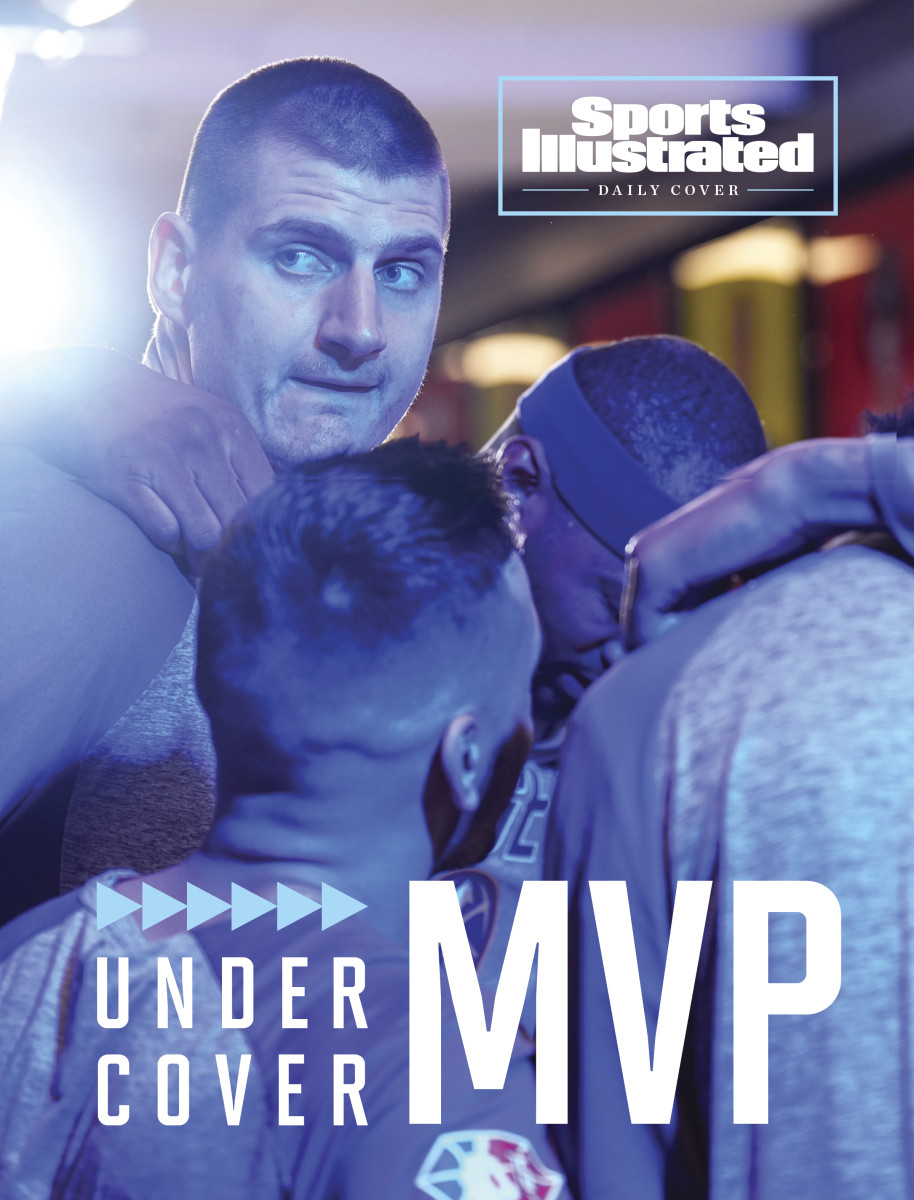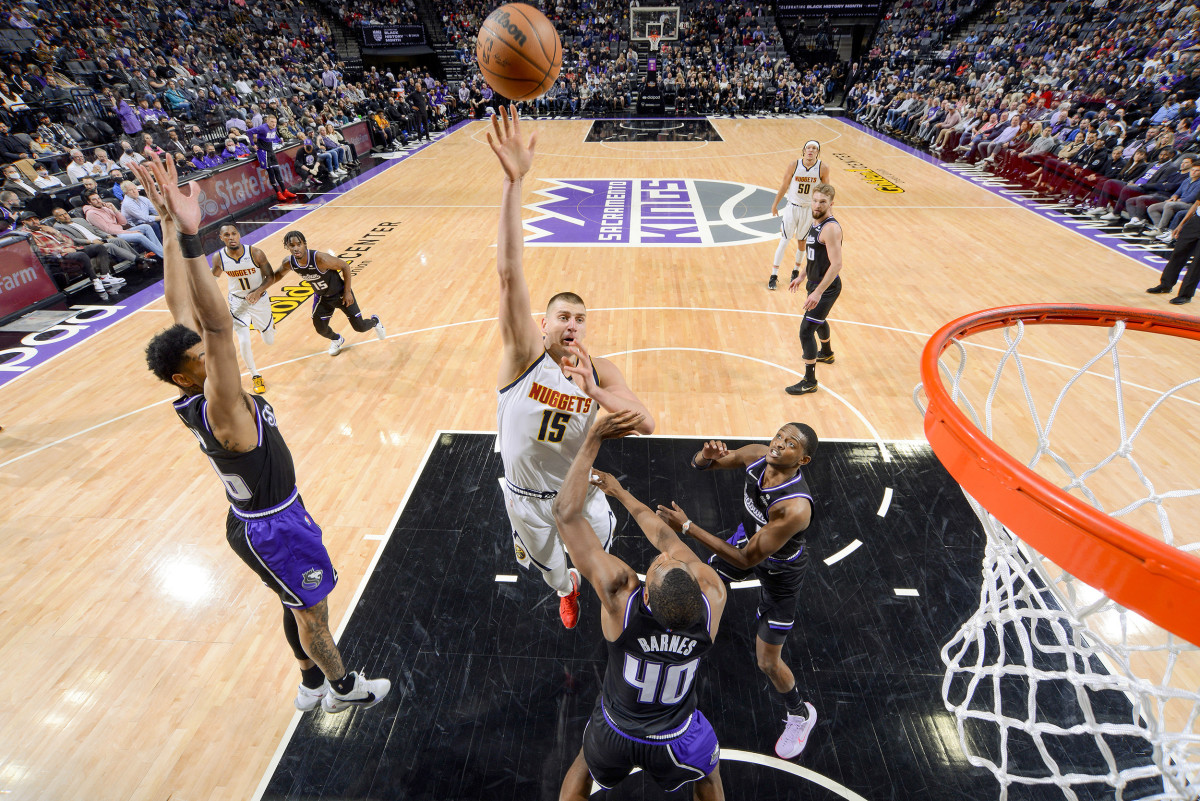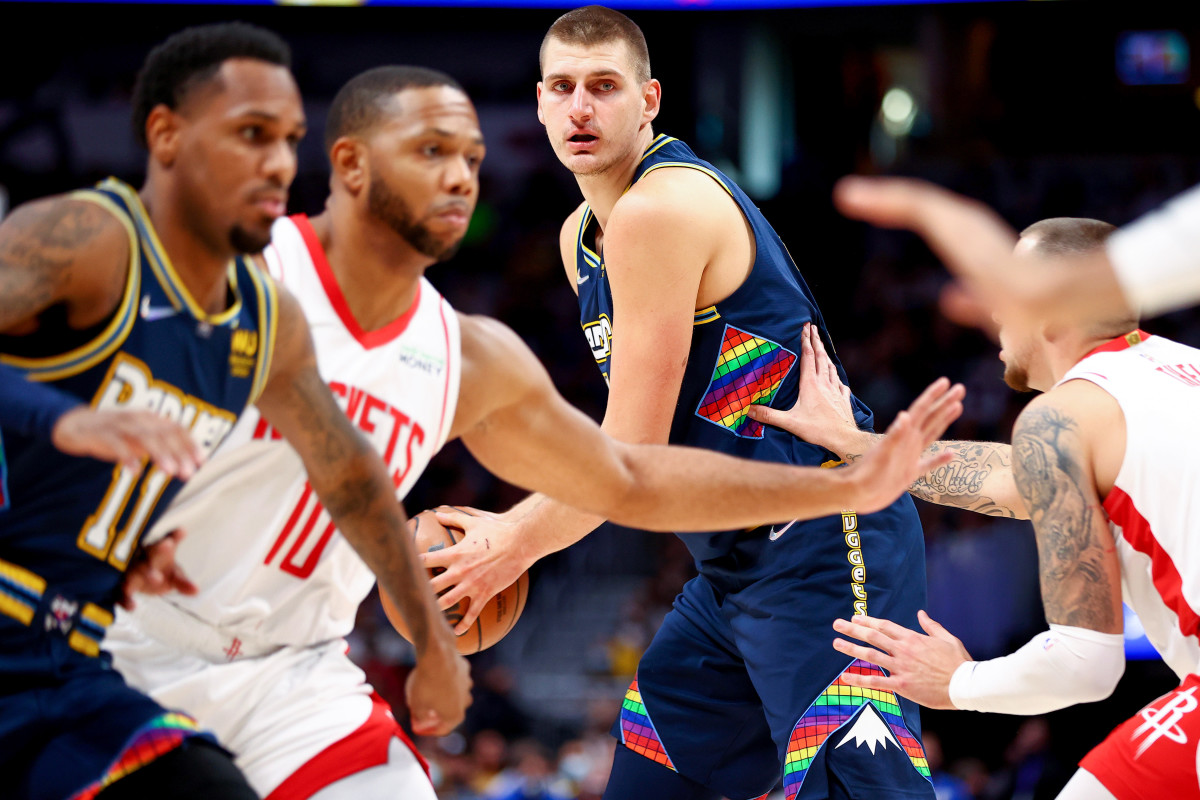Nikola Jokić Gets Lost Among the Stars. And He’s O.K. With That.
Nuggets veteran Jeff Green is not easily impressed.
Uncle Jeff, as the 14-year pro is affectionately known, has been in the NBA for so long the first jersey he wore read “SuperSonics” across the front. Green has played with Point Gods, Kings, Beards, Brodies, Easy Money Snipers and everyone in between. And still, this deep into his career, he has the capacity to be wowed by a teammate.
“There was a game we played against Sacramento,” Green recalls with a chuckle. “And I caught it in the post against De’Aaron Fox. And on video it looks crazy. It was almost like a triple team. I turned baseline. Another guy comes baseline. I turn middle, and another guy runs from the middle.
“[Nikola] Jokić sits behind me during film [session]. So I turned around and was like, ‘So that’s how you feel every day?’”
Green asks because Jokić is the NBA’s reigning MVP and currently enjoying one of the most remarkable seasons in league history. Opponents fear Jokić because he’s a one-man wrecking crew who has carried a depleted Nuggets team that’s starting to find its groove late in the season. After starting the year 18–18, Denver has gone 22–8, including winning 12 of its last 14 games. And it’s all been powered by the most unassuming superstar in the world, one who receives far more attention on the court than off of it. One who never even dreamed of being an All-Star or a league MVP.

“No, you cannot [dream about] that,” Jokić says. “Even when I came here I didn’t think about playing. I just came here to work out and be an ’NBA player’ in some way, so I never dream about it. I don’t have goals in my life. I’m just going with the flow.”
Wait, Jokić doesn’t have goals? He must have some kind of greater motivation to be one of the best players in the NBA every single night?
“I don’t know,” he says. “Some nights are just playing the game. Some nights are competing. Some nights are fear of losing. It’s never one thing. I know some guys want to be the best or whatever. I don’t have that problem. I know there are better players than me, and there will be better players than me in the future.”
All right, but at least it would mean something to him, a second-round pick from Serbia, to become one of the faces of the NBA?
“I don’t think about it. It would be a really nice thing, yes. I don’t want that or need that. I’m fine with where I am right now with my status in the NBA.”
O.K., fine. Can he at least admit dominating defenses every night is incredibly fun?
“I will say I love ice cream the most in the world. But after 10 days of ice cream you get bored of it. There are other things I love as much or more than basketball.”
Jokić’s indifference to his success is one of many traits that make him stand out among the current crop of NBA superstars. It’s not that the 27-year-old’s brand of superstardom is better than his contemporaries’. But it’s certainly different. And his go-with-the-flow demeanor belies what has been a magnificent season.

Jokić is averaging 26.1 points, 13.9 rebounds and 8.1 assists per game, a trio of benchmarks no other player in the history of the league has ever reached. He shoots 57.4% from the field, including 36% from three. He has 18 triple doubles in 53 games, a career high, and two more than he had last year in 60 games. His 32.7 PER is tied with Giannis Antetokounmpo for what would be the best all-time mark in a single season. And no team in the league is as dependent on its star than the Nuggets are with Jokić. Denver is 20.3 points per 100 possessions better when Jokić is on the floor compared with when he sits, per Cleaning the Glass. Essentially, they go from the best team in the NBA with Jokic on the floor to the worst without him.
The Joker’s biggest rival in the MVP race is fellow big man Joel Embiid, the consensus betting favorite who is having a monster season for the 76ers. And yet it’s not difficult to make the case for Jokić over Embiid.
Consider: Jokić makes more shots on fewer attempts a night than Embiid. Jokić is a better shooter from three. Jokić averages more rebounds and assists. Jokić averages more points per possession and shoots a better percentage on post-ups. Jokic’s team scores more points when he’s on the floor compared with Embiid’s. Jokić’s team also gives up fewer points when he’s on the floor compared with Embiid’s. And whatever gap defensively that existed between the two has shrunk considerably, possibly entirely. Jokić has a 48% defensive field goal percentage—the exact same mark as Embiid. And as far as team success goes, the Nuggets are only one game behind Philly even with the injuries to Jamal Murray and Michael Porter Jr. (And for what it’s worth, Denver has a better net rating, anyway.)
“I think the NBA has taken for granted the MVP in Nikola,” says Green, whose résumé includes stints with other MVPs such as LeBron James, Kevin Durant, James Harden and Russell Westbrook. “I’ve always had a problem since I’ve been here about the national spotlight that he doesn’t get that he deserves. You’re talking about an MVP who doesn’t get a Christmas game.”
The lack of spotlight is clearly a bit of a sore spot for some Nuggets, though it’s also a balancing act. En masse, the organization believes Jokić deserves more attention, even if he refuses to throw his own name in the ring. At the same time, “Where’s our First Take segment?” isn’t exactly a rallying cry.
“If you spend all your time worrying about the lack of attention, then I’m not doing my job,” says Michael Malone, who has been Denver’s coach since 2015 and is forming the league’s next great star-coach partnership with Jokić. “But I’ve come out and said publicly we don’t get the respect that we deserve. We’re in sixth place in the Western Conference without two max players. Tell me another team that could do that.”

Jokić’s own refusal for the trappings of fame clearly makes it a little more difficult for Denver’s success to resonate nationally. But it’s not like he has zero personality. Teammates say he lives up to the “Joker” moniker. Many even say he’s a master impersonator, with the uncanny ability to mimic the way Malone paces while angry or the face Bryn Forbes makes after draining a three. He’s also self-deprecating to a fault. When Malone realized early in Jokić’s career he was a skilled ballhandler, he wondered how a center developed that part of his game. Jokić responded, “Coach, you didn’t know I was a short, fat point guard growing up?”
“I’ve been around some great players,” says Malone, who has coached LeBron, Steph Curry and Chris Paul, among others. “The thing that I’ve always really enjoyed with Nikola is the lack of ego. We all have an ego. Nikola’s so down to earth, so minimal of an ego. I think when guys come here from the outside, they all know it’s Nikola’s team, but they’re amazed at how he’s also one of the guys.”
Nuggets general manager Calvin Booth adds that Jokić doesn’t expect special treatment. He can take any kind of coaching. He doesn’t need to be catered to. He doesn’t make any demands about who should be added to the roster. “He has a high EQ and a high IQ,” says Booth, “which is a rare trait.”
Jokić’s laidback personality is almost detached from how he plays. After the Nuggets blew a game against a particularly tanktastic Thunder squad on March 2, Malone ripped the team’s defensive effort, which he said carried over from a bad practice. A couple of players were so frustrated they showered and left the arena within minutes. Jokić, however, did his customary lift after the game, stood in the hallway for an interview, then strolled out of the arena alone looking svelte in a crisp, light-blue suit. People within the Nuggets organization joke that they wish they could measure his heart rate after games, because Jokić never gets too high or too low.
(That’s not to say he lacks a competitive fire. Jokić can be animated—to say the least—when he’s on the floor. He barks at refs, he gets physical with opposing centers on the block and even dishes out some hard fouls, such as his flagrants against Cam Payne and Markieff Morris.)
Yet as nonchalant as Jokić can seem at times, teammates say he is the first to arrive and last to leave for workouts, and hoops at an almost maniacal consistency. After leading Denver to the 2020 Western Conference finals in the Orlando bubble (including two 3–1 series comebacks), Jokić played every game during last season’s hellish compressed schedule (ultimately carrying the Nuggets to the second round without his starting backcourt), and he’s missed only a handful of contests this season.

Amid all the sustained success, the Nuggets are still flying under the radar.
Denver’s biggest star isn’t fodder for debate talk shows. The Nuggets were scheduled for only 14 nationally televised games this season (less than one-half the number of the under-.500 Lakers and eight fewer than the lottery-bound Knicks). Many local fans struggle to watch the team because of a contract dispute between the team’s regional sports network and Comcast and Dish Network.
Even rookie guard Bones Hyland, who says he watched tons of NBA basketball growing up, didn’t know much about the team that drafted him last July.
“To be honest?” Hyland says. “I didn’t know about Joker a lot until I got drafted. All the teams they put on the media are the hyper teams. We wasn’t seeing the Denver Nuggets like that.”
What’s surprising about the Nuggets’ lack of popularity is they have all the hallmarks of a fan favorite. The team was almost entirely built through drafting unheralded players, a group of underdogs that would make a cheesy sports movie proud. Jokić was the 41st pick. Murray was picked behind guys like Kris Dunn, Dragan Bender and Ben Simmons. Porter slipped because of medical issues. Monte Morris—starting in place of Murray—was a second-round pick. Green is a veteran who has bounced around for most of his career. Aaron Gordon, who joined Denver last season, couldn’t lead his team to sustained success in Orlando.
Meanwhile, nobody is producing highlights like Jokić. His savant-level passing is unlike any other form of entertainment in the NBA. Jokić is equally adept at having his back to the basket and throwing a no-look pass into the opposite corner before defenses even realize what’s happening, as he is at hitting a herky-jerky game-winner while jumping off the wrong foot. And these highlights aren’t for style points—they’re what Jokić’s team demands of him.
For now, with the spotlight placed firmly on other teams, Denver’s front office believes the team has largely taken on its superstar’s personality—easygoing, low maintenance and minimal ego. And while Jokić may truly be the chillest MVP on the planet—he says one of the great things about being an NBA player is the people he gets to meet, like when he met one of his favorite horsemen while traveling to Italy—he willingly carries a massive burden every night.
“You look at the team he’s had, not taking anything away from our teammates, he’s carried us the whole year,” Green says. “The guy has done everything possible to keep us afloat, without the help of anyone else, and that’s again not taking anything away from what our teammates have done.
“He averages what, 25 … ?”
Green trails off as someone tells him Jokić’s stat line for the season. Taking in the information, the 35-year-old forward can only sit back in mild disbelief.
“That’s insane,” he says. “That’s insane.”
More SI Daily Covers:
• Behind Ja Morant’s Sudden Ascent to NBA Superstardom
• Can Overtime Disrupt Basketball With … Twins?
• How Miles Bridges Put Himself in Perfect Position
